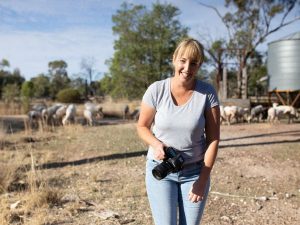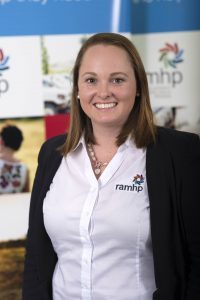2020 has definitely been the year of online connections. COVID-19 has meant that many of us have spent more time online than ever before. Whether it has been home-schooling, connecting with friends using video chat and even working from our loungeroom when that's never really felt possible before. Social media became a lifeline to connect with others, but what happens when social media starts to feel overwhelming and negative? In this episode you can hear from our experts as they share stories, experiences, and techniques for ensuring social media doesn't start impacting your mental health.
Guest Speakers
 Chantel McAlister started off life in the suburbs of Brisbane before moving to outback Queensland as a young woman. There, Chantel discovered her passion for the wool industry and for photography.
Chantel McAlister started off life in the suburbs of Brisbane before moving to outback Queensland as a young woman. There, Chantel discovered her passion for the wool industry and for photography.
Chantel has worked the past decade as a master woolclasser, travelling Australia with her partner. After becoming a mum in 2018, Chantel hung up her wool classing stencil and has been working on growing her photography business, Chantel Renae Photography, which has recently begun offering online photography courses.
After the birth of her son, social media played a powerful role in connecting Chantel with family, friends and a supportive online community.

Camilla Herbig is a Rural Adversity Mental Health Program Coordinator based in Dubbo. Camilla strives to increase awareness of mental wellbeing in rural areas and encourages help-seeking and stigma reduction activities.
Through innovative projects, local partnerships, mental health information, tailored advice, workshops and short courses, Camilla works to ensure individuals and communities know how and where to find help when it’s needed.
Background
Social media can be addictive and can get a bad rap. Of course, spending too much time online can have negative consequences for our mental health. But, what are the positives?
These days, people are using social media to connect with family, friends, and online communities. The strength of social media has been evident in recent years as regional, rural and remote NSW grappled with drought, bushfires and COVID-19. Many of us turned to social media to share experiences and remain connected during tough times.
In this episode you’ll hear about how social media can help us develop and maintain social connections, and steps you can take to ensure your social media experience is a safe and positive one.
Resources
The eSafety Commission provides a wide range of online safety programs and resources. They also provide a suite of online training sessions designed to help Australians have safer and more enjoyable online experiences.
ReachOut is an online mental health service for young people and their parents in Australia. It is a free service that’s available anytime and pretty much anywhere. They have a stack of tools, apps, online forums and fact sheets covering topics such as cyber bullying and social media. www.reachout.com
This Way Up provides step-by-step strategies for managing stress, anxiety and low mood.
Their range of tailored online courses are designed to teach you proven psychological skills to transform your thoughts, feelings, and behaviours so you can make a positive change in your life.
This Way Up is run by clinical psychologists, psychiatrists, researchers, and web technicians based at the Clinical Research Unit for Anxiety and Depression (CRUfAD) – a joint facility of St Vincent’s Hospital and the University of New South Wales.
Beyond Blue – 1300 22 4636
Beyond Blue have information and resources for parents as well as young people. They also facilitate online moderated forums on social media topics.
Beyond Blue also have a 24/7 phone line. Call 1300 22 4636.
The Beyond Blue website also has online chat (available 3pm to 12am) and online forums.
PANDA (Perinatal Anxiety and Depression Australia) – 1300 726 306
For immediate support, you can contact the PANDA National Helpline: 1300 726 306 Mon to Fri, 9am – 7.30pm AEST
PANDA’s National Helpline is available to provide support and information to families experiencing perinatal anxiety and depression.
Callers are supported by someone who really understands how they are feeling and knows how to help them take the first step to recovery. Many of PANDA’s trained counsellors – a combination of professional staff and peer support volunteers – have experienced perinatal depression and anxiety themselves. You do not need a diagnosis of perinatal anxiety or depression to call PANDA. Partners, family members and friends supporting a loved one with perinatal depression and anxiety can also call PANDA’s National Helpline.
PANDA’s website is also packed with extensive information and support resources including checklists, factsheets, information for during pregnancy, after birth, and for dads, partners and carers.
Help Services
If you or someone else is in immediate danger, call 000 or go to your nearest hospital emergency department.
If you’re concerned about your own or someone else’s mental health, you can call the NSW Mental Health Line 1800 011 511 for advice.
Having a tough time and need someone to talk to right now? The following services are there to listen and help you out. They are confidential and available 24/7.
- Lifeline – 13 11 14
- Suicide Call Back Service– 1300 659 467
- MensLine– 1300 78 99 78
- Kids Help Line (for young people aged 5 to 25)– 1800 55 1800
- Domestic Violence Line – 1800 656 463
- 1800 RESPECT – 1800 737 732
- Alcohol and Drug Information Service – 1800 250 015
